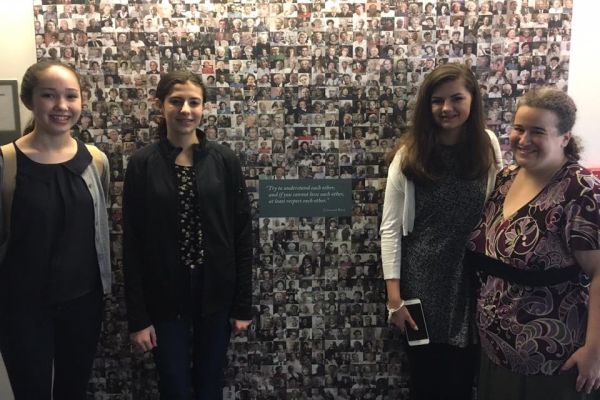A Lesson in Kindness

This morning, I stood at attention as our select chorus sang the Star Spangled Banner. Looking at the flag in the middle school auditorium, I paused a moment to feel gratitude for growing up in a country where I have the right to define and redefine myself. I grew up believing I could become whoever I wanted to be. The flag stood tall, as did I. Thank goodness, I thought, that I live in the Land of the Free and the Home of the Brave.
In 2015, I had the great fortune and immense responsibility of being one of the torch-bearing teachers to attend Auschwitz: The Past is Present professional development program in Poland led by USC Shoah Foundation and Discovery Education to commemorate the 70th anniversary of the liberation of Auschwitz. This experience gave me a horrific sorrow. However, I also felt a powerful appreciation for the fortune I have to have grown up in New York of the 1980s. Equally strong was my urgent need to do something about the current injustices in our world. If Discovery Education and USC Shoah Foundation trusted me to be a torchbearer for the survivors’ stories, I wanted to be worthy of that flame.
I committed myself to include survivor testimonies and empathy awareness into my teaching. My students and I spoke regularly about the Holocaust and about how now, more than ever, we need to be the change we wish to see in the world. An opportunity to help came when a student was a victim of name-calling. This young woman had taken to writing poetry to express her pain in a poster she created – “Label Jars, Not People” – and her suffering was clear.
That’s when the student-led poetry club, Poets Undercover Guild began. My eighth-grade student Allison Vandal saw the writing on the wall and wanted to help. She felt compelled to pen a poem and share it as an act of solidarity and consolation. Then, Caroline Waters was horrified about a Snapchat incident after a Valentine's Day dance. Again, she wrote a poem to help out. Before long, compassionate poetry became a trend. I’ve seen poems on lockers and notebooks, too, artwork of love that has extended beyond any teacher interventions.
Classmate Maya Montell loved making films. The annual IWitness Video Challenge from USC Shoah Foundation was right up her alley. She joined the Poets Undercover Guild with great enthusiasm and they spent a few lunch periods looking through the testimony in IWitness to find stories about poetry or letter writing. They found so many! Then, it was time to look through all the options and decide which ones were the best for their message.
One afternoon, the girls started filming their 2016 IWitness Video Challenge. Documenting how testimony inspired their poetry and the action to stand up to intolerance in their school. I was empowered to hear their wisdom about empathy and outreach, about words and kindness.
When the students finished, I remember sitting back and thinking, “Wow! These girls are doing this because they believe in it. They’ve written poems. They’ve researched survivor testimony. They’ve put together a video.They’ve done all this to improve the world. None of this was for a grade.” It didn’t matter if the students won the IWitness Video Challenge. What mattered is they believed in themselves.
The girls knew they still had much to do, though. They were graduating middle school, and they knew all too well that any organization needs a plan for succession. They thought about who would benefit from taking the helm of this society after they were gone. Allison used her best calligraphy to write a letter to two rising eighth graders, inviting them to lead the Poets Undercover Guild and continue to pass the torch. Just as I was torchbearer for the stories of survivors from my trip to Auschwitz, my students understood the importance of passing on stories of kindness and resilience.
Allison, Caroline and Maya’s video actually did win the 2016 IWitness Video Challenge, and I am very proud of them. However, we also really enjoyed viewing other videos from other schools. It makes me hopeful to see students taking time to add kindness to the world.
We were thrilled to travel to Los Angeles to attend USC Shoah Foundation’s Ambassadors for Humanity Gala on Dec. 8, 2016, honoring Mellody Hobson and George Lucas for their work in education. For me, it was a bit of my Holocaust education journey coming full circle. I was able to see colleagues and inspirations from my trip to Poland almost two years ago. But it was also about keeping the wheels of change turning. Now the three students are in high school, and they are increasingly empowered to make change. We listened to Harrison Ford speak about how freedom is not a right, but the responsibility to choose what is right. We heard George Lucas and Mellody Hobson talk about hope and morality. I was able to reunite with Holocaust survivor Paula Lebovics, who had accompanied us in Poland and whose testimony I share with students every year. The importance of the my former students’ mission was clearer to them than ever before.
Gazing at the flag at today’s concert, I thought about my freedoms and the many opportunities I have been granted. My students and I are so lucky. This fortune of freedom comes with a cost though. We must keep striving make other people free. We must keep empowering one another, through words and actions. My role as a teacher is to support my students as they learn how to use their freedom. Our experience with USC Shoah Foundation gives my students and I hope that we are not alone in this all important endeavor.